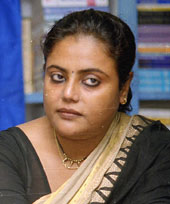 |
 |
 |
 |
 |
| GIRL POWER: (From top) Urmi Chakraborty, Roopa Ganguly, Anindita Sarbadhicary, Rituparna Sengupta and Indrani Haldar |
It’s something new. My cousin told me that I must watch this brilliant film,” said Anuradha, a 30-something homemaker, who had come to watch Ek Mutho Chhobi (A Fistful of Tales) with her friends.
She was among those waiting patiently in the long, serpentine queue in front of the entrance to the theatre, bearing testimony to the fact that the urban Bengali crowd is slowly getting hooked on the new cinema being made by a few inspired individuals in Tollywood.
“I feel very happy that my film is being appreciated by people. We have been able to invest a very paltry sum in the publicity campaign, so it’s good that the film has caught on by just word of mouth!” says an elated Roopa Ganguly over the phone, as she tries to coax her son into finishing off his meal.
One of the most popular actresses of Bengali cinema today, Roopa is the proud producer of the film, the first venture of her production company, Our Films. Comprising six individual stories on shara ripu (the six sins), the film, made on a shoestring budget, is an attempt at ‘experimental cinema’ ? a phrase increasingly being used to describe offbeat ventures in Tollywood.
“As a producer, I could have gone for something time-tested. It was not my idea, but I did everything to back the idea because it is something new and fresh. I got almost broke financing it,” says Roopa, who in her new avatar as a film producer is now a part of the generation of women producers and directors, who have been inspired by the most celebrated woman filmmaker of our time, Aparna Sen.
Over the past few years, more and more women in the Bengali film industry are taking up filmmaking. What is particularly striking is that popular actresses in Bengal, who are apparently in the prime of their careers, are shifting to producing or directing films, be it on television or on the silver screen. Gone are the days when 30-plus actresses would settle for the roles of salt-and-pepper-haired mothers-in-law and sisters-in-law in mainstream cinema, or at best for so-called meaty character roles in offbeat films. They are today keen to go independent. They too have a blueprint to revive Bangla cinema. Like the hotshot male directors and actors in town, they too are dreaming of a windfall in the Bengali media industry. For instance, top actresses like Rituparna Sengupta, Roopa Ganguly and Indrani Haldar now have their own media production companies. Rituparna’s Prism Entertainment set off with Aalo (2003) by Tarun Majumdar, which went on to become a major hit. In addition to various stage shows, the production house is now busy working on its third feature film after Bouma Zindabad. The next generation is also waiting in the wings ? Konkona Sen Sharma has just announced her plans to get behind the camera.
So what is the primary motivating factor for the actors to take up filmmaking? “You can call it a creative urge or an unfulfilled desire which an actor, be it male or female, experiences at some point in their career,” says Roopa. “Definitely, I love acting more. But you know, an actor plays just a small part in the entire creation of a film ? he or she hardly has any role to play in the director’s work. I have been associated with this film industry for 18 years. I have learnt things on the job. Now I am curious to know how it feels to be a producer and I want to experience the pain one goes through while doing this job.”
For others, it’s about putting their business acumen to good use. “I have always been business-minded. And professionalism matters to me most. So you can say production has been a natural choice,” says national award-winning actress, Indrani Haldar, who launched a production company called Indigo three years ago with her business partner Ringo. Indigo kicked off with eight telefilms in Bangladesh, with actors from both countries. Indrani herself has directed a few telefilms that have been well received by the audience. Apart from a host of telefilms for Bengali channels like Alpha Bangla and Tara, Indigo has made countless ad films, music videos and public awareness campaigns. This year, the Indigo team will start working on a full-length commercial film.
Indrani, who also runs an acting institute for budding talents, feels that she has a responsibility towards the next generation. “When I was a newcomer in this industry, it was so difficult to get work, let alone good work. As a senior actor, I feel that I should be creating opportunities for youngsters. My company has launched a lot of new faces. For instance, we found Rishi Kaushik, who’s now the main protagonist in the TV serial Ekdin Pratidin. I feel good when our boys and girls do well.”
Though interested in making new kinds of cinema, these filmmakers have their eyes firmly fixed on the box office. “Yes, there are a lot of highly talented young directors in the industry now. And they are doing a lot of experiments. Nevertheless, I’d be careful about what I choose to back,” says Roopa, who plans to turn into a director in a couple of years.
“I’d like to make good cinema. After all, it’s a kind of responsibility towards society. I am definitely interested in making films that will do good business. But that doesn’t imply that I’ll make films that have interminable song-and-dance sequences. I’d like to follow in the footsteps of Ram Gopal Verma.”
Verma is also a role model for director Anindita Sarbadhicary who feels that filmmaking is primarily an industry in which people invest a lot of money and directors today are aware of their “responsibility to make profits”. “Multiplexes have revolutionised filmmaking. And for Bengali cinema, television has been a great boon. If you observe closely, it is the TV directors who are turning to cinema in Bengal. As a result, TV plays a vital role in this ‘churning of fresh ideas in Tollywood today,’” says Anindita, who’s currently busy planning her forthcoming feature film ? a hip urban romance set in Calcutta touching upon several contemporary issues. She also plans to make a first-of-its-kind animation film in Bengali.
To Urmi Chakraborty, who made her debut on the silver screen as the leading lady of a Tollywood potboiler, Maandando, in the early nineties, ‘serious, thinking cinema’ is the most appealing genre. “I make cinema which doesn’t focus on entertainment alone. I’d like my audiences to exercise their brains,” says the director, whose Hemanter Paakhi won a national award in 2002 for the best Bengali film of the year.
What prodded Urmi to take up direction was quite a noble cause. “When Kananbala Devi died, I thought that there was very little documentation in the audio-visual media about the lives and works of such legendary actresses of yesteryear. So I started my career with a documentary on Sarajubala Devi.” And then followed a number of short films on various social issues, including Infiltrators and Water, that won critical acclaim. Urmi is now busy planning a feature film but wants to keep the project under wraps.
Though Roopa feels it’s still a man’s world insofar as filmmaking is concerned, Anindita and Urmi refuse to believe that there exists any discrimination. “It’s just that there are so few women directors in the country that people think that it’s a big deal for a woman to get into filmmaking. There’s no difference between a male director and a female director!” exclaims Urmi.
But will they make a better Tollywood? Well, that’s another debate altogether.










